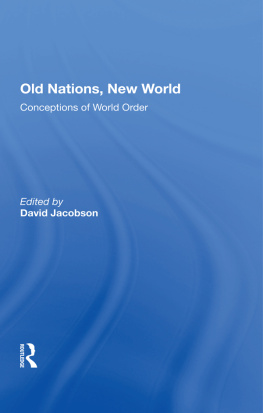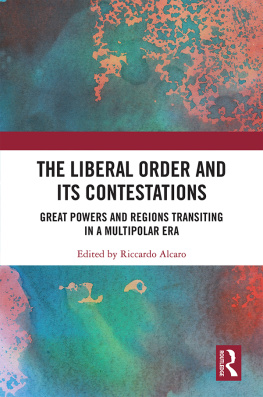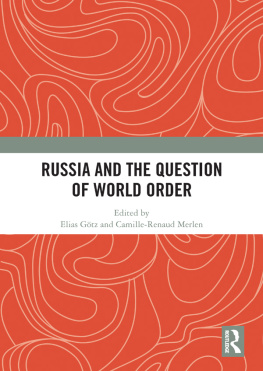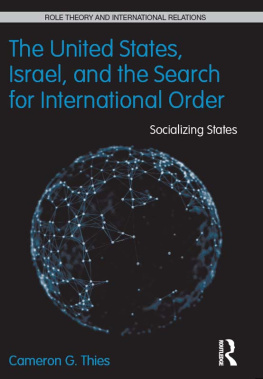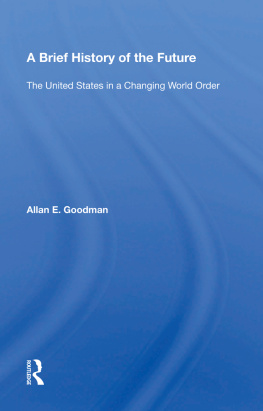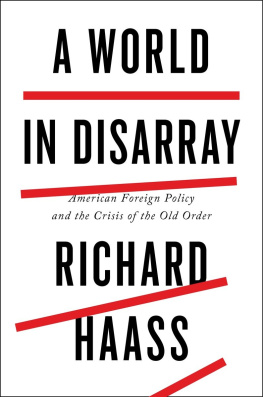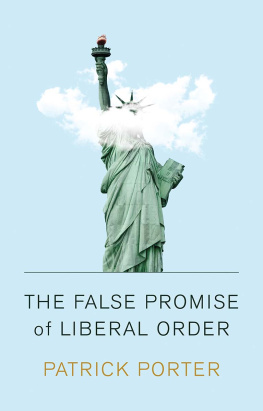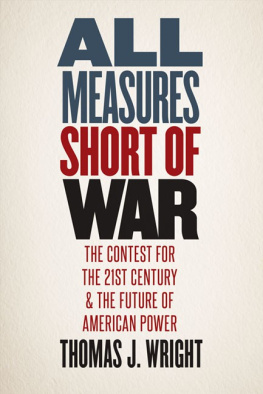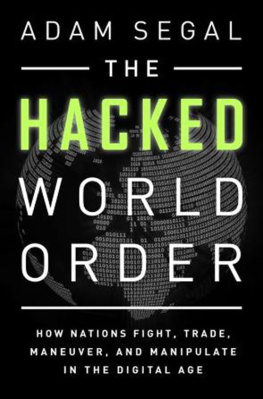ALSO BY Henry Kissinger
A World Restored: Metternich, Castlereagh and the Problems of Peace, 181222
Nuclear Weapons and Foreign Policy
The Necessity for Choice: Prospects of American Foreign Policy
The Troubled Partnership: A Reappraisal of the Atlantic Alliance
American Foreign Policy
White House Years
Years of Upheaval
Diplomacy
Years of Renewal
Does America Need a Foreign Policy? Toward a Diplomacy for the 21st Century
Ending the Vietnam War: A History of Americas Involvement in and Extrication from the Vietnam War
Crisis: The Anatomy of Two Major Foreign Policy Crises
On China
T o N ancy
PENGUIN PRESS
Published by the Penguin Group
Penguin Group (USA) LLC
375 Hudson Street
New York, New York 10014

USA Canada UK Ireland Australia New Zealand India South Africa China
penguin.com
A Penguin Random House Company
First published by Penguin Press, a member of Penguin Group (USA) LLC, 2014
Copyright 2014 by Henry A. Kissinger
Penguin supports copyright. Copyright fuels creativity, encourages diverse voices, promotes free speech, and creates a vibrant culture. Thank you for buying an authorized edition of this book and for complying with copyright laws by not reproducing, scanning, or distributing any part of it in any form without permission. You are supporting writers and allowing Penguin to continue to publish books for every reader.
eBook ISBN 978-0-698-16572-4
INTERIOR MAPS BY JEFFREY L. WARD
Version_1
INTRODUCTION
The Question of World Order
I N 1961, as a young academic, I called on President Harry S. Truman when I found myself in Kansas City delivering a speech. To the question of what in his presidency had made him most proud, Truman replied, That we totally defeated our enemies and then brought them back to the community of nations. I would like to think that only America would have done this. Conscious of Americas vast power, Truman took pride above all in its humane and democratic values. He wanted to be remembered not so much for Americas victories as for its conciliations.
All of Trumans successors have followed some version of this narrative and have taken pride in similar attributes of the American experience. And for most of this period, the community of nations that they aimed to uphold reflected an American consensusan inexorably expanding cooperative order of states observing common rules and norms, embracing liberal economic systems, forswearing territorial conquest, respecting national sovereignty, and adopting participatory and democratic systems of governance. American presidents of both parties have continued to urge other governments, often with great vehemence and eloquence, to embrace the preservation and enhancement of human rights. In many instances, the defense of these values by the United States and its allies has ushered in important changes in the human condition.
Yet today this rules-based system faces challenges. The frequent exhortations for countries to do their fair share, play by twenty-first-century rules, or be responsible stakeholders in a common system reflect the fact that there is no shared definition of the system or understanding of what a fair contribution would be. Outside the Western world, regions that have played a minimal role in these rules original formulation question their validity in their present form and have made clear that they would work to modify them. Thus while the international community is invoked perhaps more insistently now than in any other era, it presents no clear or agreed set of goals, methods, or limits.
Our age is insistently, at times almost desperately, in pursuit of a concept of world order. Chaos threatens side by side with unprecedented interdependence: in the spread of weapons of mass destruction, the disintegration of states, the impact of environmental depredations, the persistence of genocidal practices, and the spread of new technologies threatening to drive conflict beyond human control or comprehension. New methods of accessing and communicating information unite regions as never before and project events globallybut in a manner that inhibits reflection, demanding of leaders that they register instantaneous reactions in a form expressible in slogans. Are we facing a period in which forces beyond the restraints of any order determine the future?
Varieties of World Order
No truly global world order has ever existed. What passes for order in our time was devised in Western Europe nearly four centuries ago, at a peace conference in the German region of Westphalia, conducted without the involvement or even the awareness of most other continents or civilizations. A century of sectarian conflict and political upheaval across Central Europe had culminated in the Thirty Years War of 161848a conflagration in which political and religious disputes commingled, combatants resorted to total war against population centers, and nearly a quarter of the population of Central Europe died from combat, disease, or starvation. The exhausted participants met to define a set of arrangements that would stanch the bloodletting. Religious unity had fractured with the survival and spread of Protestantism; political diversity was inherent in the number of autonomous political units that had fought to a draw. So it was that in Europe the conditions of the contemporary world were approximated: a multiplicity of political units, none powerful enough to defeat all others, many adhering to contradictory philosophies and internal practices, in search of neutral rules to regulate their conduct and mitigate conflict.
The Westphalian peace reflected a practical accommodation to reality, not a unique moral insight. It relied on a system of independent states refraining from interference in each others domestic affairs and checking each others ambitions through a general equilibrium of power. No single claim to truth or universal rule had prevailed in Europes contests. Instead, each state was assigned the attribute of sovereign power over its territory. Each would acknowledge the domestic structures and religious vocations of its fellow states as realities and refrain from challenging their existence. With a balance of power now perceived as natural and desirable, the ambitions of rulers would be set in counterpoise against each other, at least in theory curtailing the scope of conflicts. Division and multiplicity, an accident of Europes history, became the hallmarks of a new system of international order with its own distinct philosophical outlook. In this sense the European effort to end its conflagration shaped and prefigured the modern sensibility: it reserved judgment on the absolute in favor of the practical and ecumenical; it sought to distill order from multiplicity and restraint.
The seventeenth-century negotiators who crafted the Peace of Westphalia did not think they were laying the foundation for a globally applicable system. They made no attempt to include neighboring Russia, which was then reconsolidating its own order after the nightmarish Time of Troubles by enshrining principles distinctly at odds with Westphalian balance: a single absolute ruler, a unified religious orthodoxy, and a program of territorial expansion in all directions. Nor did the other major power centers regard the Westphalian settlement (to the extent they learned of it at all) as relevant to their own regions.

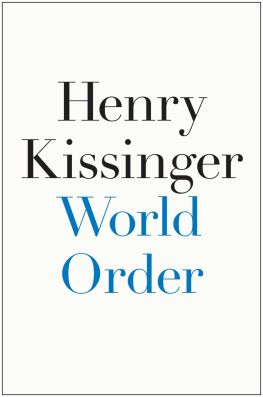
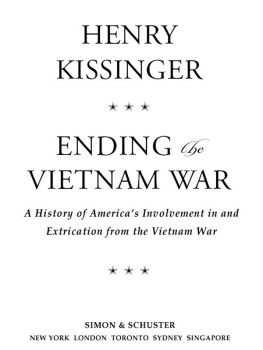
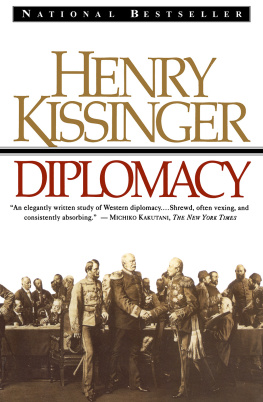
![Kissinger - Years of Upheaval: [VOL2 Classic Memoirs]](/uploads/posts/book/181244/thumbs/kissinger-years-of-upheaval-vol2-classic.jpg)

